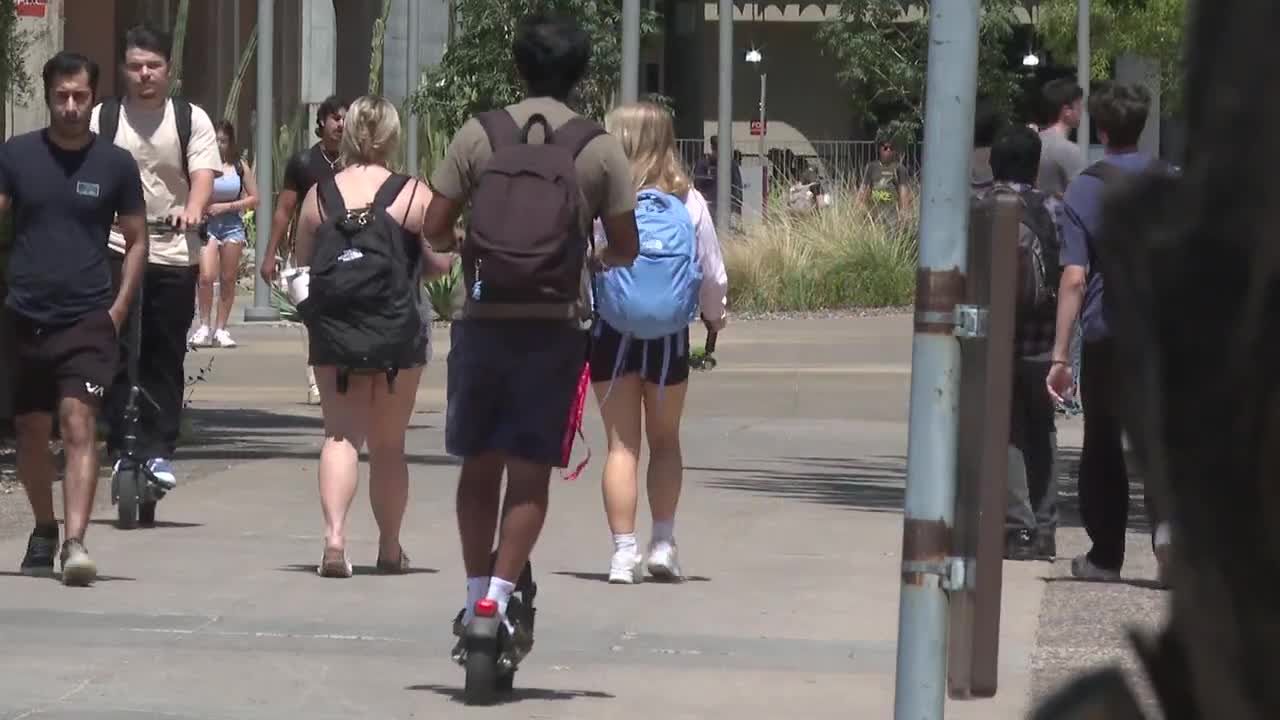TEMPE, AZ — Paying for college can feel overwhelming, but financial experts and students themselves say it is possible to afford higher education with the right strategy.
From applying early for financial aid to choosing an in-state school, students across the country are getting creative to manage rising costs.
Some, like Tan Cao, a 2023 graduate of Georgia Tech, made intentional choices to keep tuition down.
“The main reason I stayed in Georgia was because they offered in-state scholarships,” he said. “It pays for all of your tuition.”
Others, like Micah Karr, used a combination of methods.
“I had a variety of merit-based scholarships, worked my way through college, and also had help from my parents,” Karr said.
Military benefits also play a key role for some students. Antonia Harristoy, a student at Arizona State University, said the GI Bill helped her afford a full-ride.
"As a veteran, I’m able to afford 36 months of tuition,” she said.
Not all students have access to scholarships or military benefits. Juwan Wesley, a 2022 Georgia State graduate, took out personal loans to pay for school.
“I could say I was at least $100,000 in debt,” he said. “Right now, I’m around $60,000 left. So I’m almost halfway there.”
Even with the debt, he says the investment was worth it for the connections and career opportunities he gained.
"I feel like, definitely pay for the networking, but the networking paid off itself," Wesley said.
Melissa Pizzo, Associate Vice President of Financial Aid and Scholarship Services at Arizona State University, says it’s important for students and families to engage early and actively in the planning process.
“Don’t count yourselves out,” Pizzo said. “It's critical that students and families participate in the process."
Pizzo emphasizes the “three pillars” of college funding: family contributions, federal financial aid and loans, and scholarships or school-based funding.
"Start at home," she said. "What is your budget? What are your resources? What are you able to commit to helping to pay for college?"
She adds that even small savings over time can make a big difference, especially with compounding interest.
Pizzo recommends students turn to scholarships next.

Are you a Smart Shopper? What are your go-to saving tips and tricks?
Share your deals or ways to save here!
"There are many nonprofit organizations, community-based organizations, that do provide funds for students. Students can participate in competitions within High School, in clubs and organizations, and they can often earn scholarships through those mechanisms," she said.
She says every student also fills out the Free Application for Federal Student Aid (FAFSA), which determines eligibility for grants, loans, and work-study opportunities.
"That will open many doors for them to see what resources are available to help them pay," Pizzo said.
Saying in-state and work-study programs can help, too, strategies economist Jim Rounds recommends.
"The state Schools have excellent programs in specialty areas," Jim Rounds, Rounds Consulting Group President, said. "Then you figure out maybe I need to start this in high school. Maybe I need to take some of those extra classes so I can knock a year off of college, and then maybe I do need to go to a community college for a year and then wrap up at the university."
Rounds encourages students to take advantage of strategies like dual enrollment or Advanced Placement (AP) credits. He says completing a four-year degree in three years could reduce costs by 25%.
Books are another hidden cost, but savings expert Kristin McGrath suggests renting whenever possible.
“If your college bookstore allows it, get used books,” Kristin McGrath, The Krazy Coupon Lady editor, said. “There are sites where you can rent, and if you don’t need to keep it past the semester, it’s a great way to save.”
McGrath recommends Chegg for book rentals and suggests reaching out to professors to ask if older editions are acceptable.
For scholarships beyond school-funded aid, students can explore national databases like Fastweb and Scholarships.com to search for awards based on academics, interests, and background. Many community-based organizations and nonprofits also offer scholarships throughout the year.
For those taking out loans, repayment strategy matters. Pizzo stresses the importance of starting repayment early and choosing the right plan.
“They can start making their payments at any point in time, even while they’re still in school,” Pizzo said. "They can sign up for an automatic payment, which can help reduce the percentage of the interest rate that is charged."
Despite the high costs, many students say the experience and the return on investment make it worth it.
“College is a very viable place to meet people that can help you get where you want to go,” Wesley said.
Brittany Doss, a PhD candidate at Arizona State, believes higher education is about more than just a degree.
“There’s always some type of resource out there,” she said. “Higher education is what you make it.”
For students and families facing the reality of college costs, the message is clear: it takes planning, effort, and a bit of hustle, but the payoff can be life-changing.
This story was reported on-air by a journalist and has been converted to this platform with the assistance of AI. Our editorial team verifies all reporting on all platforms for fairness and accuracy.



